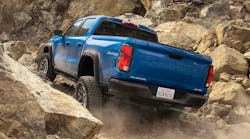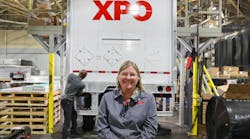When Mims Meat, Inc. expanded its Houston, TX-based meat processing and food distribution company a few years ago, it found itself suddenly needing a lot more delivery trucks — and needing them fast! The solution was to begin leasing the additional vehicles.
Dan Mims, president of the family-owned business, says that during 2005-06, his company saw an accelerated growth rate somewhere in the neighborhood of 18% to 20%. “Besides needing a large amount of tractors to support customer growth, another reason we chose to lease was because we were starting to travel longer distances than we had previously.
“Going up to 300 miles away from our Houston base,” he explains, “service became an issue if a truck broke down too far away from where one of our two mechanics could get to it easily. But by utilizing leasing assets, we can get our trucks up and running quickly.”
There are currently 28 vehicles in the Mims fleet, of which only eight tractors and four straight trucks are company owned. Last year, Mims began leasing 16, 2007 Peterbilt 379 power units from Rush Enterprises of Houston, TX. Just three months ago the company also began leasing a Peterbilt 220 straight truck through Paccar, a configuration that affords them excellent payload capacity and a better turning radius for in-town deliveries.
A large part of the growth in Mims Meat's distribution service can be attributed to its evolving relationship with Dairy Queen, its largest customer. “We've worked with Dairy Queen for over 30 years,” Mims says, “and we've grown with their business. A number of years ago they made some changes to their distribution requirements which opened the door for us to become their full food-service distributor.”
When founded by Dan's father A.D. Mims over 40 years ago, Mims Meat was primarily a meat processing and distribution company. Today, however, sales and distribution capabilities have expanded to include canned goods, other disposables, and even non-food products.
“When we go into a restaurant or store, we try to sell them everything they will use in their business, excluding only fresh produce and bakery items,” Mims explains.
Customers for Mims Meat include commercial and industrial foodservice providers throughout most of Texas and into parts of Arkansas, Oklahoma and western Louisiana. In addition to 240 DQ stores, Mims distributes to over 500 other restaurants and cafeterias, nearly 30 health-care facilities, and a number of other meat distributing companies as well.
Most deliveries to customers are made one to two times per week, Mims reports. The 23 full-time drivers are each assigned to a truck, and routes vary from same-day service to over-night and back the next day.
Mims notes that drivers are also responsible for unloading their own trucks at the store locations, although shipping crews at the Houston warehouse will load vehicles at night, starting at six in the evening.
“There was a point in our business lifecycle where in order to remain profitable we had to decide to either just sell to other distributors or continue distribution ourselves, but increase the amount of product being dropped per delivery.” Mims explains.
“We chose to continue with distribution, which required us to expand our product mix considerably to get order sizes up. We also switched to multi-temp, 48-ft. trailers to accommodate the varying types of product being shipped in one trailer.”
The Mims Meat trailer fleet includes one dry van and 19 reefers (a combination of Great Dane and Utility models) equipped with Thermo King refrigeration units. The straight trucks are equipped with 20- and 24-ft. refrigerated box vans manufactured by Morgan.
In a highly competitive business where service is the only thing that can distinguish one foodservice provider from another, Mims says the trick is to marry company capabilities with customers' service needs. “That's where the job gets difficult,” he states. “You have to have good relationships and work with your customers to solve problems. We've been quite successful at that.”


